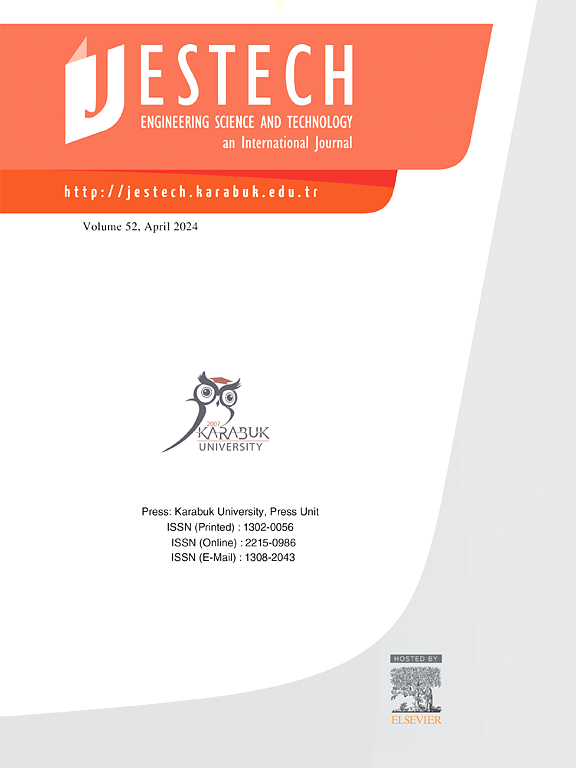Prediction and optimization of electrical resistivity and unconfined compressive strength of cement-treated subgrade soil using I-optimal response surface methodology
IF 5.1
2区 工程技术
Q1 ENGINEERING, MULTIDISCIPLINARY
Engineering Science and Technology-An International Journal-Jestech
Pub Date : 2024-11-22
DOI:10.1016/j.jestch.2024.101878
引用次数: 0
Abstract
This paper addressed the challenge of effectively evaluating and controlling the compaction quality of cement-stabilized subgrade soil during construction. It proposed using soil electrical resistivity as a geophysical technique to assess soil properties, alongside statistical analysis and optimization methods. Through I-optimal response surface methodology, the study modeled and optimized relationships between key soil properties and electrical resistivity. Statistical tools enhanced understanding of the interplay between soil electrical resistivity and unconfined compressive strength. Microscopic analysis revealed cation exchange and pozzolanic reactions contributing to soil stabilization. The desirability function was employed for multi-objective optimization, determining optimal values for electrical resistivity and unconfined compressive strength. Overall, the research provides a practical approach for deploying soil electrical resistivity systems in compaction quality control, potentially improving the efficiency and effectiveness of subgrade construction processes.
利用 I-优化响应面方法预测和优化水泥处理过的基层土壤的电阻率和无压抗压强度
本文探讨了如何在施工过程中有效评估和控制水泥稳定基层土壤的压实质量。它建议使用土壤电阻率作为一种地球物理技术来评估土壤特性,同时使用统计分析和优化方法。通过 I-optimal 响应面方法,该研究对关键土壤特性和电阻率之间的关系进行了建模和优化。统计工具增强了对土壤电阻率和无约束抗压强度之间相互作用的理解。显微分析表明,阳离子交换和胶凝反应有助于稳定土壤。在多目标优化中使用了可取函数,确定了电阻率和无压抗压强度的最佳值。总之,这项研究为在压实质量控制中部署土壤电阻率系统提供了一种实用方法,有可能提高基层施工过程的效率和效果。
本文章由计算机程序翻译,如有差异,请以英文原文为准。
求助全文
约1分钟内获得全文
求助全文
来源期刊

Engineering Science and Technology-An International Journal-Jestech
Materials Science-Electronic, Optical and Magnetic Materials
CiteScore
11.20
自引率
3.50%
发文量
153
审稿时长
22 days
期刊介绍:
Engineering Science and Technology, an International Journal (JESTECH) (formerly Technology), a peer-reviewed quarterly engineering journal, publishes both theoretical and experimental high quality papers of permanent interest, not previously published in journals, in the field of engineering and applied science which aims to promote the theory and practice of technology and engineering. In addition to peer-reviewed original research papers, the Editorial Board welcomes original research reports, state-of-the-art reviews and communications in the broadly defined field of engineering science and technology.
The scope of JESTECH includes a wide spectrum of subjects including:
-Electrical/Electronics and Computer Engineering (Biomedical Engineering and Instrumentation; Coding, Cryptography, and Information Protection; Communications, Networks, Mobile Computing and Distributed Systems; Compilers and Operating Systems; Computer Architecture, Parallel Processing, and Dependability; Computer Vision and Robotics; Control Theory; Electromagnetic Waves, Microwave Techniques and Antennas; Embedded Systems; Integrated Circuits, VLSI Design, Testing, and CAD; Microelectromechanical Systems; Microelectronics, and Electronic Devices and Circuits; Power, Energy and Energy Conversion Systems; Signal, Image, and Speech Processing)
-Mechanical and Civil Engineering (Automotive Technologies; Biomechanics; Construction Materials; Design and Manufacturing; Dynamics and Control; Energy Generation, Utilization, Conversion, and Storage; Fluid Mechanics and Hydraulics; Heat and Mass Transfer; Micro-Nano Sciences; Renewable and Sustainable Energy Technologies; Robotics and Mechatronics; Solid Mechanics and Structure; Thermal Sciences)
-Metallurgical and Materials Engineering (Advanced Materials Science; Biomaterials; Ceramic and Inorgnanic Materials; Electronic-Magnetic Materials; Energy and Environment; Materials Characterizastion; Metallurgy; Polymers and Nanocomposites)
 求助内容:
求助内容: 应助结果提醒方式:
应助结果提醒方式:


